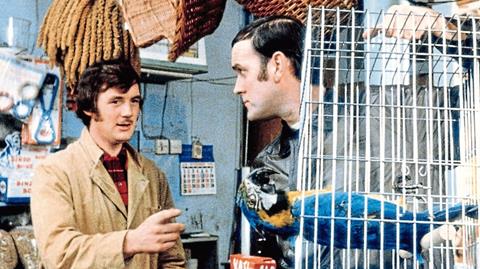Paul Cable encourages Christian parents to think, act and speak to their youth and children as if God really is alive

“This parrot is no more! It has ceased to be! It’s expired and gone to meet its maker! This is a late parrot! It’s a stiff! Bereft of life, it rests in peace!”
The dead parrot sketch from Monty Python continues to be one of my all-time favourites. This hilarious exchange between John Cleese and the shopkeeper that has just sold him the parrot (played by Michael Palin who insists that it is simply sleeping), is the perfect recipe for absurd and unforgettable comedy.
I wonder whether our efforts at passing on faith are sometimes received a little like this sketch? The working assumption today is that God is dead. For many of us in the thick of parenting, the world is no longer an enchanted place full of the possibility and potential to encounter the divine. We have “outgrown” God, relegated Him to “myth”, and replaced Him instead with notions of scientific progress. So, when we talk about God with our young people, immersed in this cultural story, could it come across like we are trying to flog them a dead parrot? Could it be that our attempts to highlight God’s relevance are perceived as admiring the “beautiful plumage” of a deceased bird?
the best way to answer the question “is God dead?” is with our lives
What does it look like to share something of God with your children and their friends, during a time when he is assumed dead? Follow me for a moment into the ancient wisdom of the prophet, Habakkuk.
Habakkuk lived in Judah, the southern kingdom of Israel during a time of injustice, idolatry and political tensions. Somethings don’t change! Lingering in the background was the constant threat of the Babylonian empire. What is the role of a prophet in this scenario? To call the people of God to repentance and to renew their faith commitment, right? Well, you would think so. Rather than addressing Israel Habakkuk flips the script and addresses God directly! The book reads more like a prayer than a prophetic witness. And not just any prayer, but a cry of lament. We read Habakkuk’s intimate and personal wrestles, his struggle to believe that God is good in a world so full of evil. Where is God in the midst of this? Is He dead? Sleeping?
Read more
Make your home the safest space for the biggest conversations with your youth and children
At a crucial point in the book, Habakkuk prays:
“LORD, I have heard of your fame; I stand in awe of your deeds, LORD. Repeat them in our day, in our time make them known” - Habakkuk 3:2.
Habakkuk at this moment, where all seems lost, relies on God to be the one to act. Rather than rushing into action himself, calling others to repentance and faith, he simply steps back and asks that the God who acted in the past will act in the present. The best way to demonstrate to the world that God is alive, is to live in a way that demonstrates that to be true. Sometimes, this requires us to simply get out of the way. Here are three ways I think you can do this your young people:
1. Bring God into the conversation
I find myself sometimes rushing to answer young people’s questions, to put my Bible nerdery to good use. Such a rushing to answer questions might however reveal my underlying anxiety that God is dead and can’t defend Himself! There is certainly a place for exploring big questions (as you will see from this series), sharing the good news of Jesus with those around us, and sometimes, even getting nerdy about it. However, we want the reality of God to be the centre of these activities not just our beliefs about Him. Therefore, prayer becomes central to all we do. Maybe I should find myself saying to young people more, “that’s a great question, shall we ask God about that?”. This becomes especially important when those questions are coming from a place of doubt, disappointment, pain and lament. This is where Habakkuk finds himself, rather than seeking quick answers, he asks God to act. This sounds like something you would do with a powerful and living God! Let’s talk with God who is in the room with us, rather than talking about Him like he is some distant memory or a concept that can be learnt in a classroom.
2. Allow for the “strangeness” of God
Other people are weird, have you noticed that? They speak and act in strange ways, sometimes in ways that we don’t expect or understand. Learning to make space for “otherness” is an art that takes time and practice. Not often do we get to the point where we feel we fully know another human being. This is of course true for God as well. He does and says things that are strange to us. I sometimes find myself shying away from this strangeness, trying instead to be a kind of brand consultant that seeks to make God look more attractive and relevant to younger generations. When I do this however, I begin to develop an idea about God rather than surrendering to the reality of who God is. Instead, I wonder how I might help young people lean into the “otherness” of God? To expect Him to feel unfamiliar and strange and to see this as an opportunity to know Him more deeply and meaningfully? God is strange to us. Rather than worrying that this might put young people off, I wonder whether it is the very thing that will provoke curiosity and draw them to Him!
3. Daily Rhythms
I have suggested that the best way to answer the question “is God dead?” is with our lives. Do we pray in a way that relies on God to meet us in our questions and doubts? Do we lean into His strange otherness, rather than seeking to rebrand Him and make Jesus cool? The greatest challenge I face however, is living each day in the way of Jesus. Does my own son, and the young people I serve in my church, see the living God through the way I organise and live my life? Do they get a glimpse of my enjoyment of God when I pray? My striving to know more of God through my reading of Scripture? My treatment of those around me made in His image? We can construct clever arguments for the existence of God, but young people will see and meet with Him as we develop daily rhythms and practices and invite them to join in with us to encounter the living God first hand. I invite you, to speak with the young people in your life to work out together what living in the way of Jesus might look like in your home and community.
So, as we engage with the younger generation about faith, let’s ensure our message isn’t like trying to sell the ‘beautiful plumage’ of a parrot long gone, but rather, demonstrating through our lives that God, unlike the parrot, is very much alive and active in our world today.




































